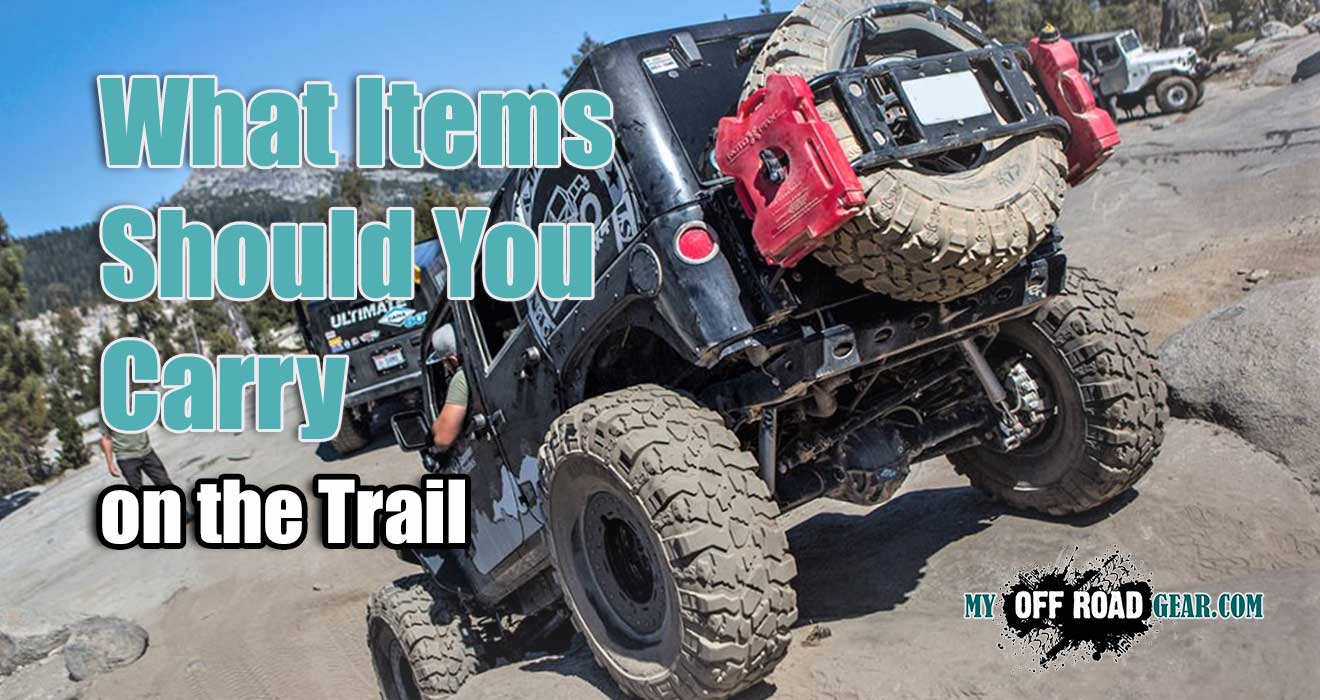Most people are aware that there are some essential items that should be kept in a vehicle…a cell phone and a spare tire come to mind. There are however several other items which while they may not be required, could come in helpful in an emergency. This article will highlight some of those specific items.
Safety and Survival Items
Be prepared for any situation by keeping these basic items in your vehicle. Best of all is that you probably already have most, if not all of them.
Embarking on an off-road adventure is an exhilarating experience, but it’s crucial to be prepared for any situation that may arise. Before hitting the trail, it’s essential to equip yourself with the right gear to ensure a safe and enjoyable journey. In this article, we will explore the must-have items you should carry with you on the trail, providing you with peace of mind and confidence during your off-roading escapades.
Quality Recovery Gear
When venturing off the beaten path, the unexpected can happen, such as getting stuck in mud, sand, or a tricky terrain. That’s why it’s essential to have quality recovery gear on hand. Invest in a sturdy recovery strap, a winch, D-rings, and a snatch block. These tools will prove invaluable in helping you get out of tricky situations and back on the trail.
Spare Tire and Tire Repair Kit
Flat tires are a common occurrence while off-roading. To prevent being stranded in the middle of nowhere, always carry a spare tire that is properly inflated and in good condition. Additionally, having a tire repair kit, including a patch kit, tire plugs, and a portable air compressor, will allow you to address minor tire punctures swiftly.
First Aid Kit
Safety should always be a top priority. Accidents or injuries can happen at any time, so it’s crucial to have a well-stocked first aid kit readily available. Include essentials such as bandages, antiseptic wipes, adhesive tape, pain relievers, and any personal medications. Familiarize yourself with basic first aid procedures to handle minor injuries effectively.
Navigation Tools
When exploring unfamiliar trails, having reliable navigation tools is crucial. Carry a detailed map of the area, a compass, and a GPS device. These tools will help you stay on track and avoid getting lost, ensuring a smooth and stress-free journey.
Communication Devices
Maintaining communication while off-roading is essential for safety and coordination. Invest in a reliable two-way radio or a satellite phone to stay connected with your group or emergency services in remote areas with no cell phone coverage. Having a whistle or signaling mirror is also helpful for attracting attention if needed.
Emergency Supplies
Prepare for unexpected situations by carrying emergency supplies. Pack extra food, water, and warm clothing, even if you’re only planning a short trip. Additionally, include a multi-tool, flashlight, matches, a fire starter, and emergency blankets. These supplies can prove invaluable in case of unexpected delays or emergencies.
Vehicle Maintenance Essentials
Off-roading can take a toll on your vehicle, so it’s essential to carry basic maintenance essentials. Include items such as a tire pressure gauge, jumper cables, a basic tool kit, spare fluids, and a fire extinguisher. Regularly check your vehicle’s condition before each trip and address any issues promptly.
Be prepared for any situation by keeping these basic items in your vehicle. Best of all is that you probably already have most, if not all of them. These essential items will let you take care of basic needs and keep you safe no matter the situation.
- Pull-along or vehicle winch, I strongly recommend picking one of the Best Winch for 4×4 but if you’re on a budget the Pull-along could save the day.
- Second Vehicle and a Buddy, Never attempt a trail alone unless your Superman and can pick up your vehicle after you are pinned under it and fly to the hospital.
- Kinetic recovery rope or chain, I recommend a strap, chains long enough to be useful are very heavy to haul in your vehicle. Use a strap rated 4 times your vehicle GVW and a minimum of 30 feet long.
- Axe or Chainsaw for clearing blocked trail only. You need a permit to cut wood in a National Forest.
- Shovel, you may find it necessary to caress Mother Natures’ skin to free your vehicle. Also provides a substitute for flushing if you get my meaning.
- Hand tools, know what common tools are needed on your vehicle, and metric or standard.
- Traction is everything for the off-road, but it’s not easy to find traction these days. Thankfully, traction boards are here!
- Hi-Lift Jack, factory jack won’t do jack when you’re twisted up crawling through rocks and pop a bead. Can be used as a winch also, read the directions that came with your Hi-Lift.
- Full-size spare tire, don’t even think of using a spare more than two smaller ones unless you enjoy overhauling axles and transfer cases. Tire plug kit, spray can of ether do blow tire beads on, seek experience to do so, or pick portable tire inflator for off-road tires.
- Jumper Cables, 12 gauge electrical wire, mechanics wire, electrical tape, nylon zip ties, misc. hose clamps and of course duct tape.
- 2qts engine oil, 2qts gear oil, 2qts automatic transmission fluid if you have automatic, 1-pint brake fluid.
- Spray lubricate, Spray brake cleaner, works great for drying inside of wet distributor. Aluma-seal, a tube silicone.
- Belt(s) and hoses misc nuts, bolts, and other possible useful hardware.
Conclusion
As an off-roader, being prepared is key to a safe and enjoyable experience on the trail. Carrying the right gear ensures you can handle unexpected situations and make the most of your off-road adventure. Remember to check your gear before each trip and replenish any used or expired items. Stay safe, have fun, and enjoy exploring the great outdoors with confidence.


